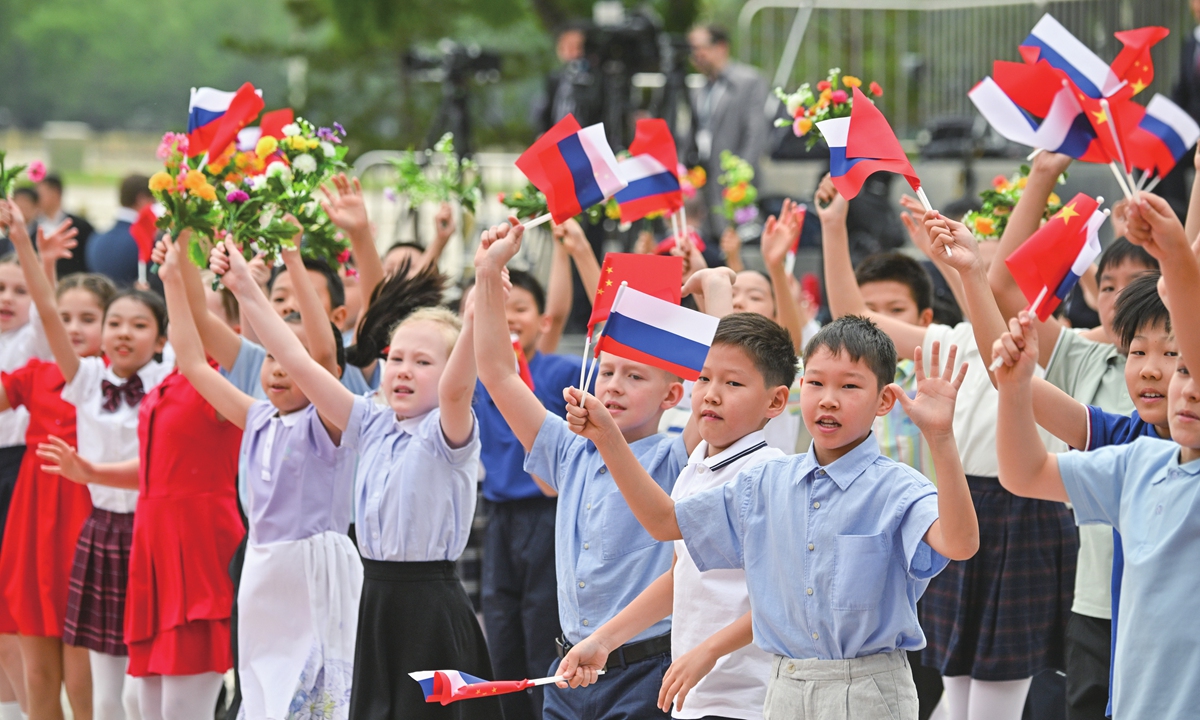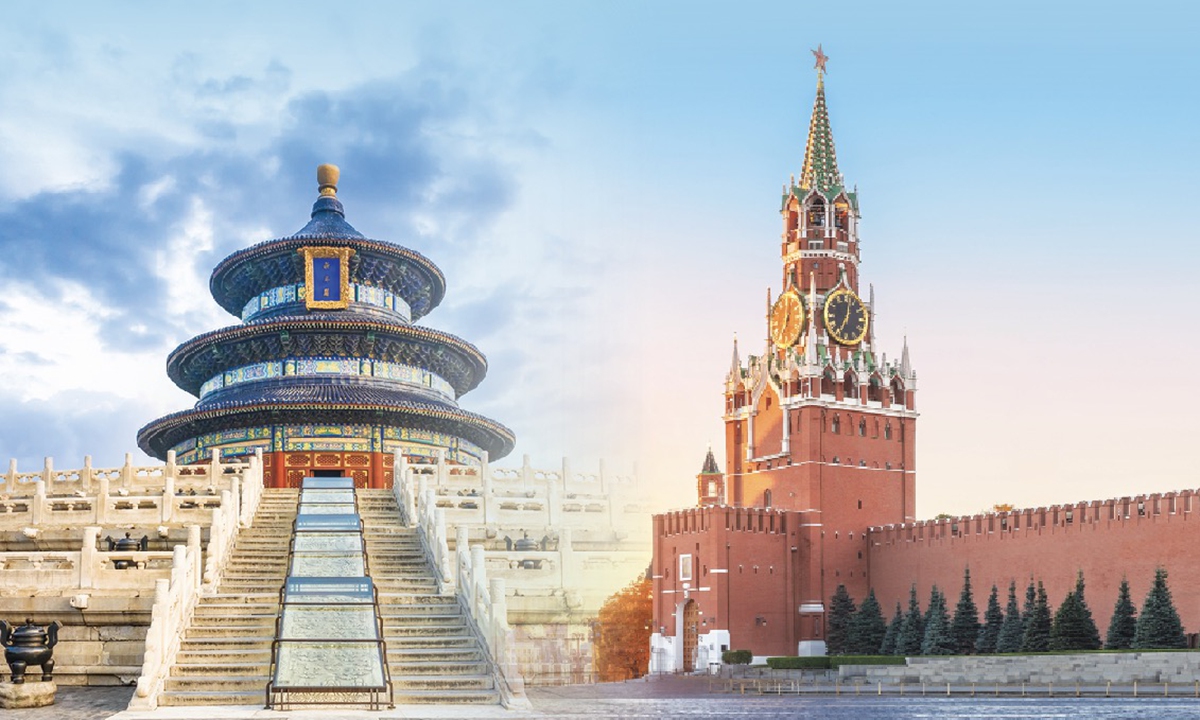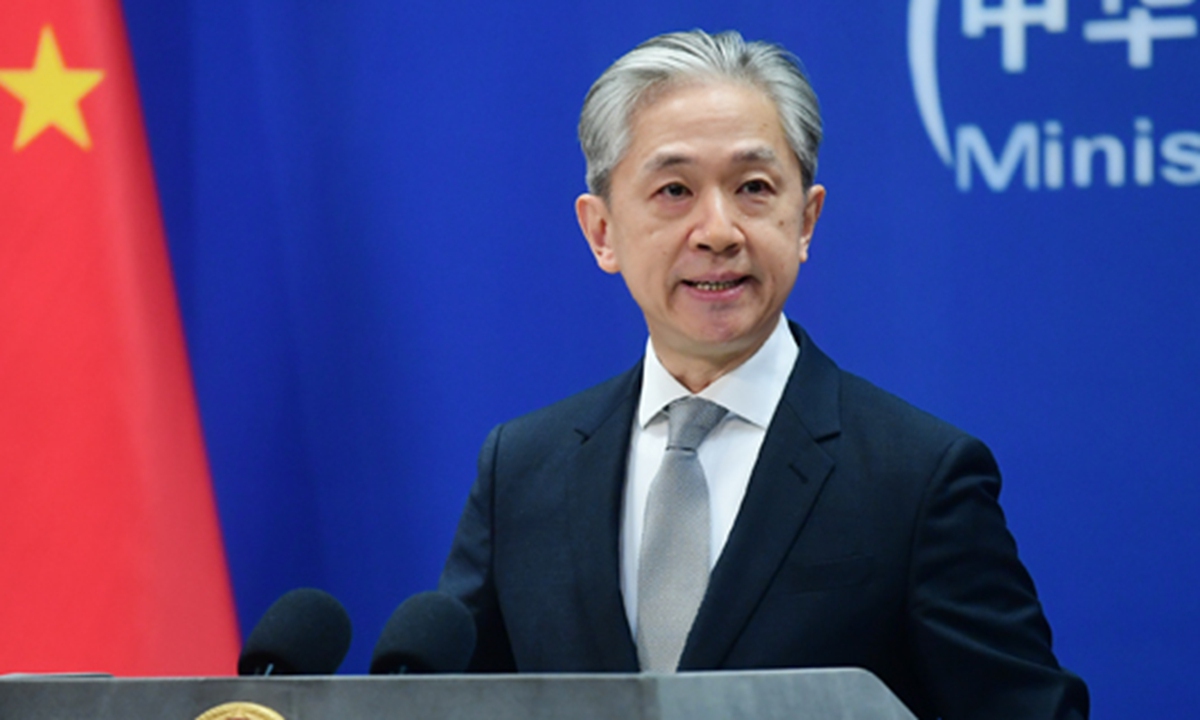OPINION / GLOBAL MINDS
We have lost the West, but we have discovered ‘the rest’: Dugin

Children wave Chinese and Russian flags before a welcome ceremony for Russian President Vladimir Putin outside the Great Hall of the People in Beijing on May 16, 2024 Photo: VCG
Editor Note:
Russian political philosopher and analyst Aleksandr Dugin (Dugin), whom some Western media call the "Putin's brain," is one of the most controversial scholars in Russia and has now joined China's social media platforms such as Sina Weibo and Bilibili, to seek more and deeper communication with Chinese web users and scholars.
Before the announcement of Russian President Vladimir Putin's state visit to China, Global Times (GT) reporter Yang Sheng had an exclusive interview with Dugin in Moscow, where he shared his views about China-Russia relations and responses to some sharp and critical comments made by Chinese netizens on his opinions.
Some questions and answers have been edited for brevity and clarity
GT: How do you predict the outcome of President Putin's state visit to China and also the future about the China-Russia relations?
Dugin: In diplomacy there are many things that have symbolic meanings. This is Putin's first foreign visit after his reelection and inauguration. This visit is, however, quiet unique. There is something more behind - the will of the creation of a multipolar world.
China is not just a part of Western capitalist, liberal, economic and political system, but it's already out of this system. China participates in it, it's connected with it, but it is a totally independent pole, a sovereign and civilizational state. So, there is no question about China representing such a sovereign pole and pillar of multipolar world order.
The other pillar is Russia. When these two pillars of a multipolar world are meeting and communicating, it's to show the will to continue to build this multipolarity with the two most important instances of it. The world today is not unipolar anymore, so the hegemony of the Western power is over.
Thanks to this communication and cooperation between two poles or two pillars (China and Russia), the other countries and regions also want to join "the multipolar club," such as India, the Islamic world, Africa and Latin America.
That doesn't mean we are constructing or building alliance against someone. Now, if the West accepts multipolarity, they can participate in the construction of this multipolar world. But if the West continues to oppose an emergence of this multipolarity, we will be obliged to fight against this attempt, not against the West, but against hegemony.
We have seen already many times that when the West declares something they pursue, they presume that there is the "rules-based world order." But when it comes to contradiction with their interests, they simply change that position.
They invited China into the open global market, but when China started to gain an edge, some Western countries started to impose some protectionist measures against China. They change the rules to serve their own interests, because they are "the rules."
Together, we want to defend against any attempt to destroy this multipolarity or to maintain hegemony of any power in the world.
GT: How could Russia overcome all those difficulties and challenges that it has experienced in the past two years since the outbreak of the Ukraine crisis in 2022? A series of sanctions have been launched by the Western world against Russia, but last year we see that according to the data released by the Russian government, the Russian economy has realized about 3.6% GDP growth in 2023.
Dugin: In order to answer your question, we need to research different versions of the participation and globalization process. You Chinese have very special experience in that. You entered the globalization as more or less a country delayed in its development. And during and after reforms you have managed to use the participation in globalization to your favor. You have taken all the positive sides of that and to save and reinforce the sovereignty and the rule of the Communist Party of China (CPC). These have guaranteed your country some kind of stability.
Russian experience of participation in the globalization was quite different. First of all, we lost order. We lost our geopolitical system, including our control over Eastern Europe. We lost Warsaw Pact countries and gave them to NATO. We accepted Western values, Western systems, Western type of constitution, and we lost the Soviet Union.
We also lost our industries, our economy and our financial system. We lost everything during the 1990s. So those are two different experiences of the globalization process. China's style is better and realized the fast growth while also preserving its own independence and sovereignty. Now the wisdom of Deng Xiaoping and the CPC, during all of these decades, is clearly manifested.
Putin, when he came to power, he started to restore this sovereignty of Russia step by step. Sovereignty was put at the center of his politics. And when we were cut from the globalist Western economy, we did not lose anything. But we gained because we were obliged to the will of our own, even this will possibly make us lose some interests. And at the same time, we were not isolated and rediscovered that we are not lonely in this world.
There are a lot of partners, such as China, the Islamic world, India and so on. We have also discovered who is willing to cooperate with us. We have found that more and more countries are interested in being involved in an economic partnership with Russia. We have discovered the other replacement for the West, such as countries in Africa and Latin America, so we have lost the West, but we have discovered "the rest."
GT: You have recently opened your personal accounts in some Chinese social media platforms such as Sina Weibo and Bilibili. Many Chinese web users are following you to see what you are going to say to the Chinese public. Why did you do that, and do you read the comments made by Chinese netizens?
Dugin: First of all, I have great respect for modern China and traditions in China. I wrote a book called The Yellow Dragon, dedicated totally to the Chinese civilization from the beginning to the modern time. Now I'm seeing the glory of China's spirit, culture and philosophy. And that is the book of a China lover and admirer.
Now I consider that we need to elaborate more the philosophical basis of China-Russia friendship. The two countries are not just tactical partners but are an alignment between two great civilizations, and in order to promote this, we need to understand each other better.
Our societies, cultures, civilizations, traditional values are very different. They get divergent, and in some elements, they are convergent. In order to promote a full-scale dialogue between two civilizations, I have decided to open social media accounts in China and to talk to the Chinese public, to open discussion. In this, I'm just expressing my opinion on what is going on in Russia, what is going on in the world, how Russians see the importance of China, and what principles should be put in the basis of our future relations.
I started with a very friendly gesture and open for discussion. But after that, a huge wave of debates emerged, and for me, this is amazing and astonishing. I didn't expect that.
Some people started to use some fragments of my previous opinions from the 1990s, when we lived in a totally different condition in Russia. Before Putin, the country was ruled by "the traitors of our civilization." I considered [at that time] that China is entering the globalization and it will lose its sovereignty, and it is going to betray its traditional values to in favor of global capitalism by betraying its socialist and communist ideas.
GT: So in the 1990s, you thought that China would be changed by globalization, and maybe even join the West to become a threat to Russia. But after that you changed your opinion because China also changed, and China's change surprised you, because you didn't expect that and then you became friendly to China and you support the China-Russian friendship again. Is that correct?
Dugin: Absolutely! Absolutely! The fact that the change was about 25 years ago, so it was not a new change.
My opinions have changed because China has changed, the world has changed, Russia has changed, geopolitics has changed. And it is not correct to use my opinions that are taken out of context to attack me.
I finally changed my opinion after I made visits to China from the 2000s. I met with many Chinese intellectuals, and we had serious and very fruitful discussions. At present, I have a totally different opinion, not only theoretically, but I am heavily involved in working to lift the life of China's academic society. The more I know about China, the more I admire it.


